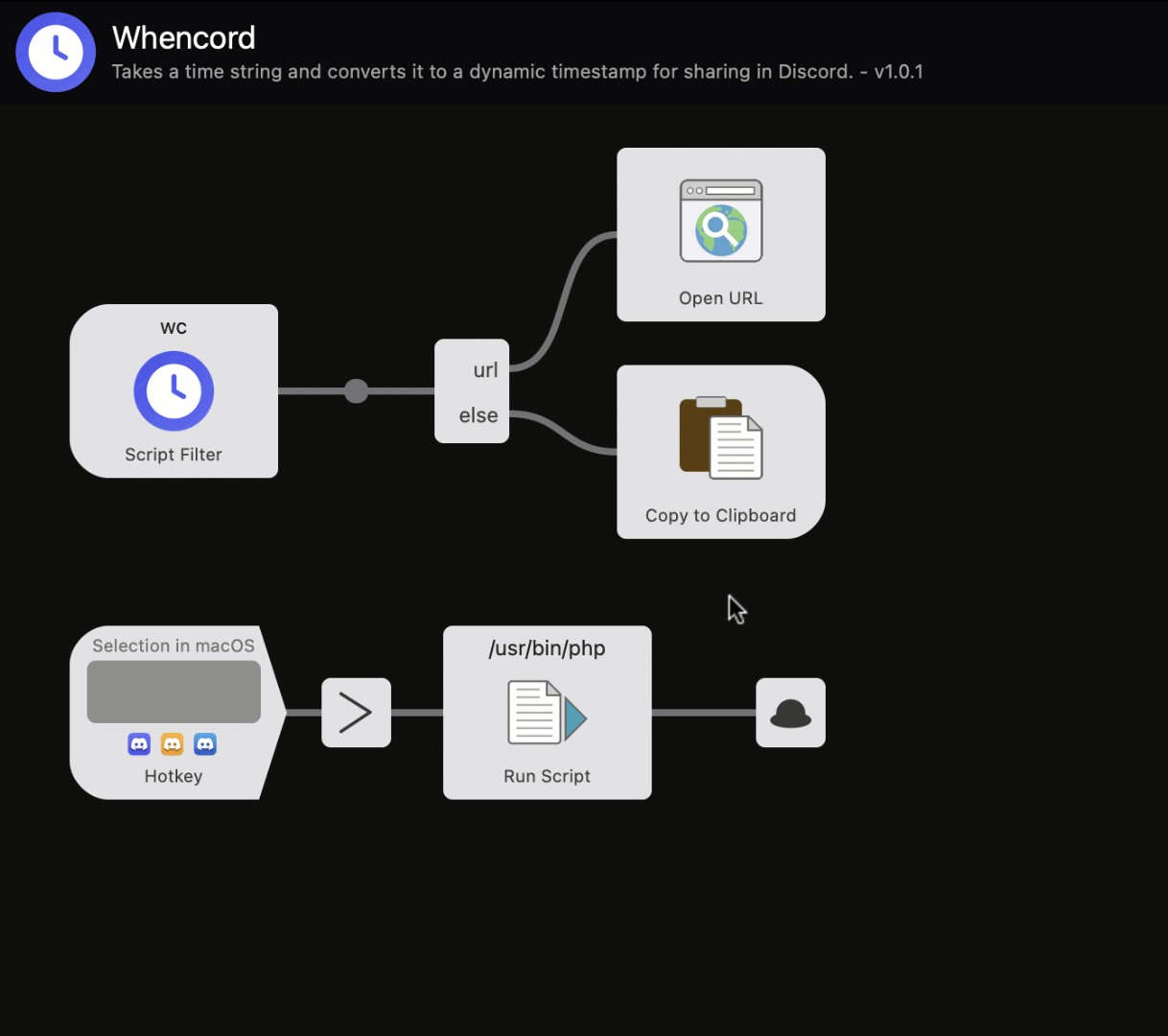Takes a time string and converts it to a dynamic timestamp for sharing in Discord.
Download the latest release here.
Note: Written for Alfred 4+. Requires nodeJS to be installed.
If you don't already have nodeJS installed, you'll need it to use Whencord. This is because Whencord uses moment.js (the same package Discord itself uses). I originally wrote Whencord using a similar PHP package but the relative time and localisation was not a close enough match. I could then have written the whole thing in NodeJS of course, but then we'd miss out on PHP's wonderful string to time conversion.
TL;DR: Install Homebrew. Then it's as simple as opening the terminal and running:
brew install nodejs
MacOS Monterey users: Some stock packages have been removed from MacOS Monterey; this includes php. If you are using
MacOS Monterey, after installing Homebrew, you can quickly and easily install PHP. It's as simple
as: brew install php.
Automation permission: When you first run Whencord, you may be prompted to allow Alfred to control Alfred. This sounds a little confusing, but this is essentially a script within Whencord that wants to be able to modify Whencord's own workflow config on the fly, ensuring you don't have to fiddle around with any configuration, automating it all for you. Please click "OK" and you won't be prompted for this again.
wc <datetime>— Convert a human readable time (PHP DateTime) to a dynamic timestampwc :<unix timestamp>- Hotkey — Quickly launch from Discord (Discord application must be the front most window)
- uses text selection within Discord (if text is selected)
Choose a time format from the resulting list. The dynamic timestamp is copied to your clipboard and pasted into the front most application in MacOS.
Some usage examples:
wc tomorrow 2pmwc today at 8pm*wc 9.30pm(today at 9.30pm)wc next Thursday 13:30wc third weds June 2023(the third Wednesday of June 2023)2021-02-23 14:002021-02-23 2pm(same as the above)2021-08-15 23:40:44.720305+00:00wc 3pm pdt(15:00 in the PDT timezone)+9 hours(9 hours from now)+2 hours 20 mins(2 hours and 20 minutes from now)wc :1640433600(unix timestamp)
For more examples of supported time strings and how to construct them, see the tables shown on the following pages for relative, time, date, and compound formats.
* Strictly speaking, the word at (e.g. tomorrow at 2pm) is not supported, but I decided to help by filtering this out
of any input.
There are only three variables in the workflow's configuration sheet; these are set automatically when you first run Whencord. You should not need to configure anything, but these options can be customised if you wish.
| Option | Meaning |
|---|---|
locale |
This variable is auto-created to match your main system language, but can manually be set to any locale supported by moment.js. |
nodePath |
This variable is auto-created to match the path to your nodejs binary, but can manually be set if you wish to use a different bin (e.g. /usr/local/bin/node or wherever you have it installed.) |
localTimezone |
For local time, use a different timezone than your system clock. If left blank, your system timezone will be used automatically. |
When you import an Alfred workflow, any hotkeys are stripped out and must be reconfigured by the end user.
Setting a hotkey for Whencord is not required, but it remains the recommended way to quickly trigger Whencord. Head to the workflow settings and set your chosen hotkey as shown in the image below.
I recommend using ⌘T (in Discord this hotkey is already bound to the quick switcher, but you can still use ⌘K for the quick switcher, so by using ⌘T we're setting a quick and easy hotkey while not overriding anything important).
Alfred-Whencord is released under the MIT Licence.
Credit to DJDavid98's HammerTime, which inspired me to bring the concept to an Alfred workflow.

